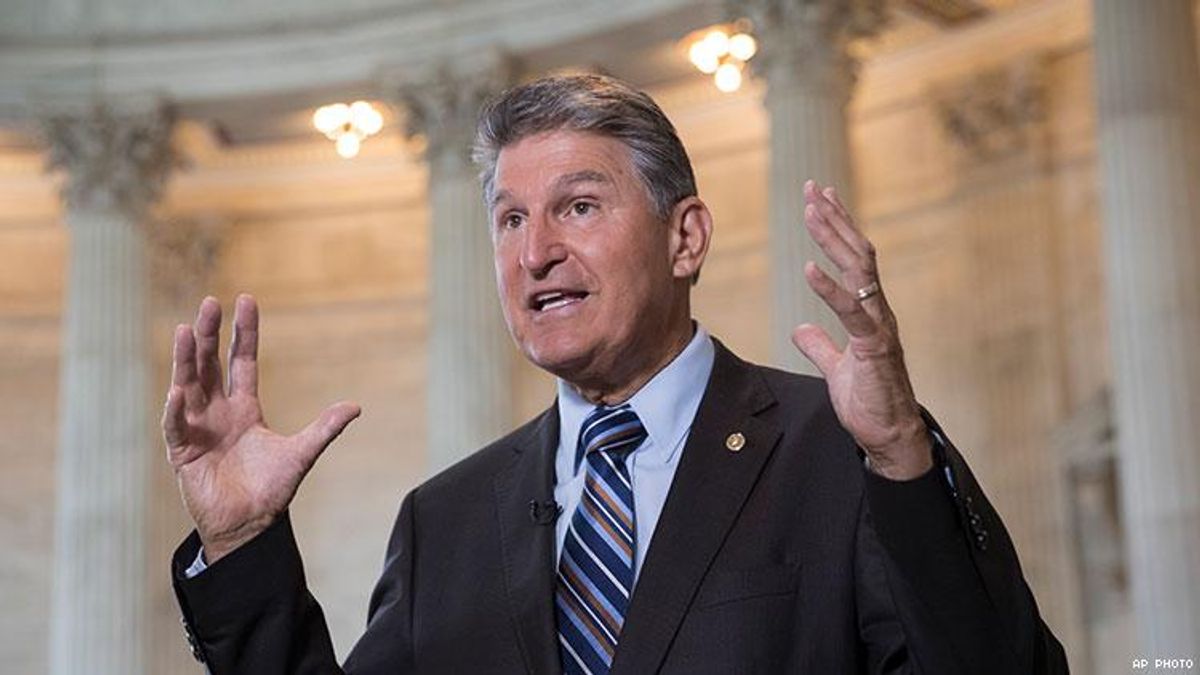All Rights reserved
By continuing to use our site, you agree to our Private Policy and Terms of Use.
The only Senate Democrat who didn't sign on to a landmark LGBTQ nondiscrimination bill won't cosponsor it because the legislation protects trans students.
Forty-six Democrats in the U.S. Senate signed onto the Equality Act when it was introduced last week. If passed, the legislation would update the Civil Rights Act of 1964 and the Fair Housing Act of 1968 to add gender identity and sexual orientation as protected characteristics. Tammy Baldwin, one of the few openly LGBTQ members of the Senate, said the bill would help the country "ensure that we are passing on to the next generation a country that is more equal, not less."
One Democrat, however, refrained from attaching his name to the Equality Act: West Virginia Sen. Joe Manchin.
In a statement, Manchin claimed he is "not convinced that the Equality Act as written provides sufficient guidance to the local officials who will be responsible for implementing it, particularly with respect to students transitioning between genders in public schools."
"I strongly support equality for all people and do not tolerate discrimination of any kind," he added. "No one should be afraid of losing their job or losing their housing because of their sexual orientation."
The Equality Act, which has received 230 total cosponsors in the House and Senate, protects against anti-LGBTQ discrimination in nearly all walks of life -- including employment, federal funding, credit, the jury system, education, and public accommodations.
Trending stories
Those last two areas are particularly critical for transgender students. Those categories ensure that "transgender students are protected, from harassment, exclusion from school facilities, and other forms of discrimination," as the National Center for Transgender Equality notes. This would include everything from a trans student being forced to play on a school sports team that doesn't align with their gender identity or being ejected from a locker room because they don't "belong" there.
Joseph Cohen, executive director of the West Virginia branch of the American Civil Liberties Union, said it's "extremely disheartening" that Manchin rejected the bill over trans-inclusive protections. In an email to The Advocate, he called the Equality Act "more timely than ever given the level of bigotry and hate we recently saw pour out of our state legislature."
The Mountain State made national headlines in 2019 when Eric Porterfield, a Republican lawmaker in its House of Delegates, called the LGBTQ community the "modern-day version of the Ku Klux Klan."
Porterfield's comments were made in response to debate over West Virginia's own nondiscrimination law. Four different bills introduced in the state legislature this year would prevent LGBTQ people from being fired from their jobs, denied housing, or refused service at a restaurant because of who they are or who they love.
Andrew Schneider, executive director of Fairness West Virginia, said Manchin's statement does not reflect the progress his state has made on LGBTQ issues, calling the lawmaker "out of step" with his constituency.
"West Virginia has set records in recent years with the number of municipal LGBTQ-inclusive nondiscrimination ordinances passed," he said in an email to The Advocate. "In 2016, we passed more than any other state. We now have 12 statewide, covering approximately 200,000 people."
According to Schneider, West Virginia was the only state where a Republican Majority Leader signed onto a statewide LGBTQ civil rights bill. In total, 36 lawmakers signed on to support the four proposals -- both conservatives and Democrats.
These lawmakers "wanted their names in bold letters on the bill, unlike Joe Manchin," he claimed.
Manchin's position may be unsurprising to those familiar with his record on LGBTQ issues, however. A self-proclaimed moderate, he did not sign on to the Equality Act when it was last introduced in 2017. He also was one of the last Senate Democrats to hold out against supporting same-sex marriage -- along with Arkansas's Mark Pryor and Louisiana's Mary Landrieu.
As recently as October, Manchin claimed he personally opposes marriage equality but has accepted the Supreme Court's Obergefell v. Hodges ruling as settled law.
Last year Manchin received the lowest rating among all Democratic aenators on the Human Rights Campaign's Congressional Scorecard. Scoring just a 30 out of 100, he actually came in behind two of his GOP colleagues -- Alaska's Lisa Murkowski and Maine's Susan Collins.
In a statement to The Advocate, HRC, the nation's largest LGBTQ civil rights group, said it is "committed to continuing to work with Sen. Manchin" to secure his support for the Equality Act.
"Typically, the kind of guidance Sen. Manchin raised is provided by federal agency regulations for implementation after passage of legislation," said HRC Government Affairs Director David Stacy. "Federal courts are already holding schools accountable for discrimination against transgender students, and guidance and best practices are readily available."
Manchin's press team did not respond to three requests from The Advocate for comment on this story.
It's not first time, though, that the Manchins have faced scrutiny over their positions on trans issues. One of the lawmaker's cousins, Harrison County Schools Superintendent Mark Manchin, came under fire in November when an administrator in his district, Liberty High School Assistant Principal Lee Livengood, challenged a 15-year-old trans student to use the urinal in front of him.
After a brief unpaid suspension, the Harrison County Board of Education reinstated Livengood in a unanimous vote earlier this year.


















































































Fans thirsting over Chris Colfer's sexy new muscles for Coachella